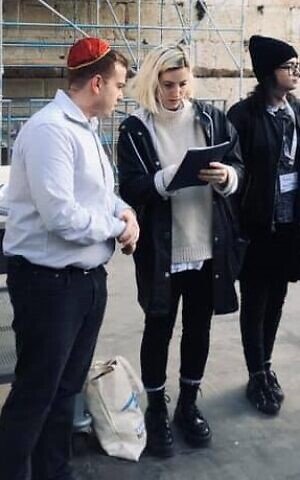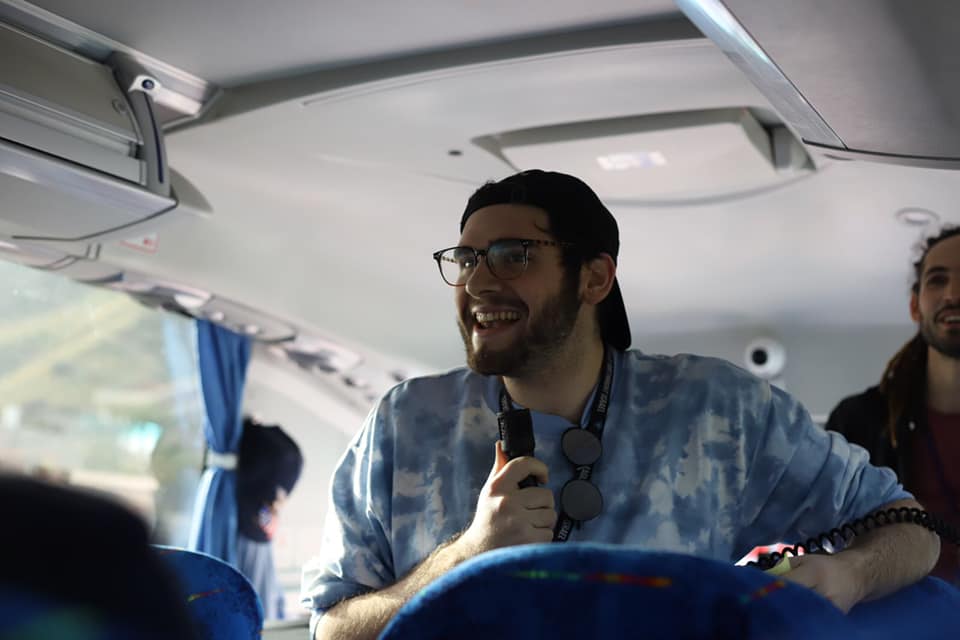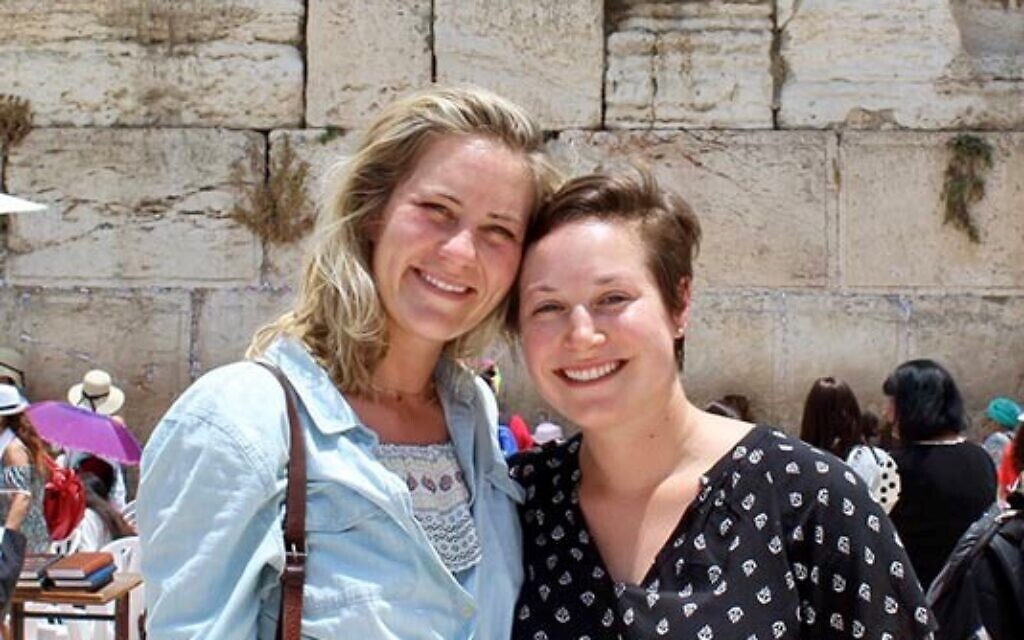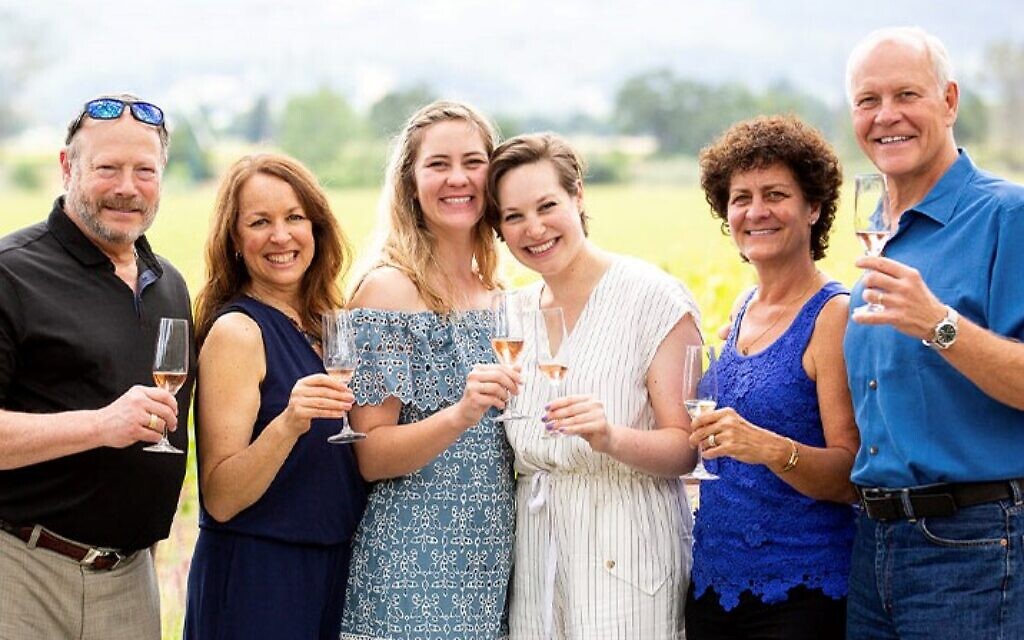NEW YORK — Soon after Birthright Israel was launched in 1999, some stakeholders began to refer to the trips as “Jewish baby-makers.” Indeed, Birthright’s founding philanthropists – Charles Bronfman and Michael Steinhardt – said they created the program to push back against high endogamy rates.
Two decades later, Birthright’s brand is widely seen as welcoming to Jewish students of all kinds, including LGBTQ participants. Birthright operates several LGBTQ-cohort trips each year, but queer participants report “feeling at home” even on standard birthright trips.
The birthright has taken more than 750,000 young Jews on educational tours to Israel. According to Layla Fedor, LGBTQ birthright visits are a “double mitzvah.” In late 2019, Fedor took an LGBTQ nativity tour with organizer Israel Outdoors, said the 30-year-old designer of home products.
“Querness is family, so in such an environment [an LGBTQ Birthright] you might be making shidukhim (matches),” Fedor told The Times of Israel.
“Any birthright journey is already about understanding who we are and looking inside ourselves,” Fedor said. “The LGBTQ journey I staffed was very, very intense for the participants.”

Birthplace Israel employee Laila Fedor and participant Mika Salomon at a banai mitzvah for travel participants at the Western Wall (courtesy)
One of the participants traveling on Fedor’s bus was transgender, she said, and the birthright was the first time the participant was called her preferred pronoun by a group of people.
“I can’t get over how wonderful it felt to be around people who can love and accept her for who she is and in a Jewish environment,” Fedor said.
“Birthright Israel has always tried to engage with our audience and their needs,” said Noah Bauer, Birthright’s VP of Marketing. “It was never about making Jewish children.”
Embedded on each trip are several Israeli participants who form the so-called “mifgash” (encounter) component. More than 115,000 Israelis have participated in “mifgashim”, including LGBTQ visits.
According to Bauer, birthright is similar to other organizations that “need to respect diversity,” she told The Times of Israel.
“Working on your Jewish identity and your gay identity, sometimes mixing the two,” said Bauer, who oversaw the implementation of LGBTQ birthright visits in 2013.
According to Bauer, Birthright runs “cohort” trips based on market demand. Many LGBTQ visits have been called “pride” birthrights because they coincide with Tel Aviv’s annual gay festival.
“We want everyone to feel comfortable and have their own track,” Bauer said, adding that the trips are – for example – designed for participants with disabilities; Trips for college sports teams, and trips for culinary arts students.

David Ratz made a nativity trip to Israel in 2020 (courtesy)
As a recruiter for Birthright Israel, based at New York University, 26-year-old David Ratz has made five trips. One of those trips, in December 2019, was an LGBTQ trip, Ratz told The Times of Israel.
“My main motivation is that I want to help people like myself find community,” Ratz said. “After 10 days of birthright, people have got a community that lasts for many years,” said Ratz, who now “I do” Birth coordinator at NYU.
‘A nice Jewish girl’
When Tatiana Lundstrom decided to move to birthright Israel, she initially considered participating in a “Pride” trip.
“But when I told my father about that particular journey, he said there was more to me than just being gay,” Lundstrom said. According to the 28-year-old civil engineer, “he said outdoor adventure travel sounds more like mine.”
Lundstrom joined an outdoors-themed nativity trip in 2017. In addition to the standard nativity trips to the Western Wall and Masada, their tour – organized by Yale Adventures – offered hikes, rafting, camping and more.
A few days after the trip, Lundstrom fell in love with co-participant Haley Harris-Bloom. three years later, the couple took Their wedding vows in Auckland, New Zealand.

Tatiana Lundstrom and Haley Harris-Bloom at the Western Wall in Jerusalem during their Nativity trip to Israel (courtesy)
“My dad likes to tell people that I went on birthright and met a nice Jewish girl,” Lundstrom told The Times of Israel.
“Even though I didn’t go on ‘gay’ birthright, given that those trips were an option, I felt comfortable with the organization in general,” Lundstrom said. “I saw that they were openly supportive of queerness and accepted LGBTQ+ Jews as a minority rather than a minority,” she said.
my dad likes to tell people i went on birthright and met a nice jewish girl
At least six or seven of the participants on Lundstrom’s birthright identified themselves as queer, he said.
“As people realized that there were a lot of other participants queuing up, there was never a problem,” Lundstrom said. “It was a very accepting and multi-cultural experience,” she said.

Tatiana and Hailey Lundstrom celebrate their wedding with their parents (courtesy)
As a Jew who is often told that she “doesn’t look Jewish,” Swedish-Jewish Lundström appreciates learning colors from Jews on her travels. She was no longer alone in “not looking Jewish”, Lundstrom said, adding that “everyone on the trip was embraced and welcomed to share their stories and experiences.”
Lundstrom’s partner Haley, who took her last name, said she saw Birthright as an opportunity to “connect with my Judaism”, and not necessarily a path of love.
A trained nurse, Haley was drawn to Birthright because she wanted to find the Jewish community, she said.
“At the time I don’t think I appreciated building a gay community as much as I wanted to build a Jewish community,” Haley told The Times of Israel. ,[But] There is an understanding among queer Jewish people that is deeper than words,” she said.
“When I met Tatiana, we had a rapport that was worth watching,” Haley said. “I think our identity as queer Jews provides us with a lens that helps us approach the world with compassion, inclusion, and not take our privileges lightly.”
(Times of Israel correspondent Matt Lebovic made 14 nativity trips to Israel between 2006-2014. In late 1999, he participated in the first round of nativity visits through Hillel International and Boston University Hillel.)